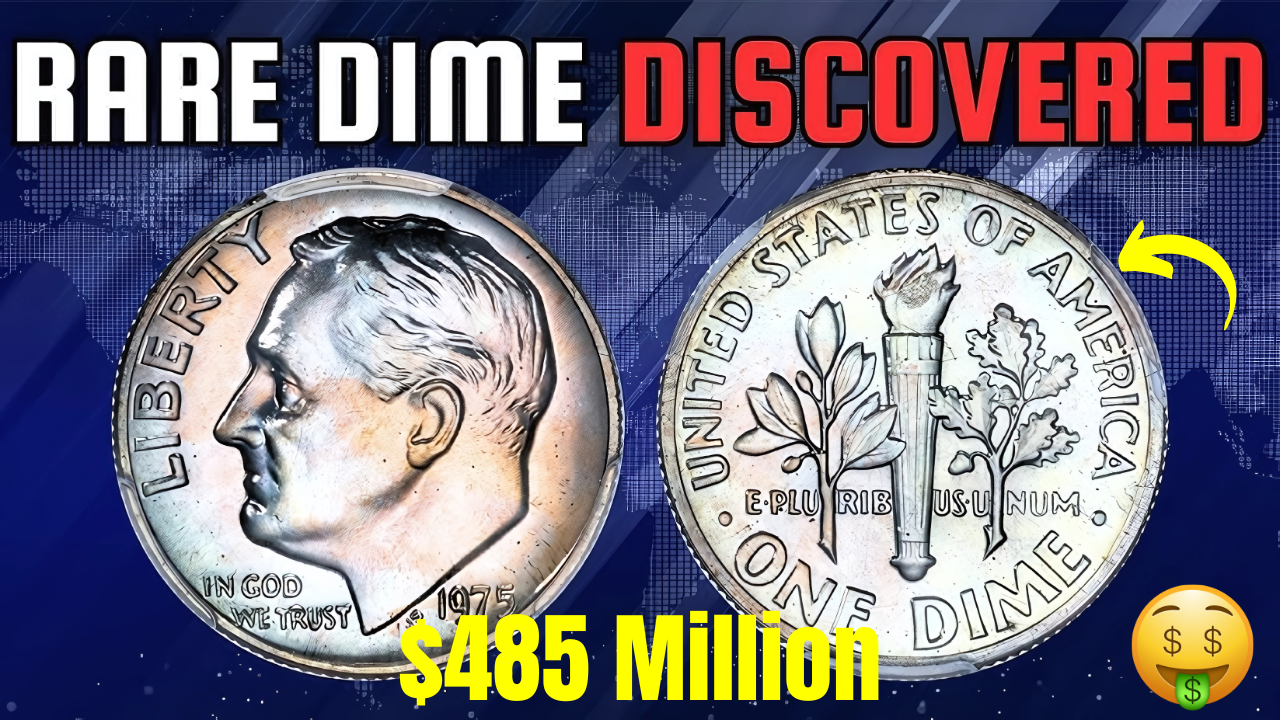Coin collecting is a hobby that bridges history, artistry, and financial opportunity. Among the vast array of coins minted over the years, a select few stand out for their rarity, historical significance, and astronomical value. In this article, we explore five rare dimes and bicentennial coins whose combined value is reported to be as high as $485 million, according to recent collector insights and market trends. Whether you are a seasoned numismatist or a curious novice, understanding these coins can help you spot hidden treasures in your own collection.
Why Rare Dimes and Bicentennial Coins Are So Valuable
Rarity, condition, and historical context are the three pillars that determine the value of collectible coins. Coins with low mintage numbers, minting errors, or unique designs can command prices far beyond their face value. The coins featured here are not only rare but often come with fascinating stories that add to their desirability.
Overview of Key Rare Dimes and Bicentennial Coins
Below is a summary of five of the most sought-after coins, including their minting details, rarity, and estimated value.
| Coin Name | Minting Detail | Rarity/Key Feature | Estimated Value |
|---|---|---|---|
| 1894-S Barber Dime | San Francisco Mint | Only 24 minted; fewer than 9 exist | Over $2 million |
| 1916-D Mercury Dime | Denver Mint | First year of series; 264,000 made | Over $100,000 |
| 1975 No-S Roosevelt Dime | San Francisco Mint (proof) | No “S” mint mark; only 2 known | Over $450,000 |
| 1968 No-S Roosevelt Dime | San Francisco Mint (proof) | Missing mint mark; <20 exist | Over $30,000 |
| Bicentennial Quarter (Errors) | U.S. Mint, various | Double die, off-center, missing marks | Up to $10,000+ |
In-Depth Look at Each Coin
1894-S Barber Dime
History and Significance
The 1894-S Barber Dime is one of the most legendary coins in U.S. history. Only 24 were ever minted at the San Francisco Mint, and fewer than nine are known to exist today. The circumstances of its creation remain a mystery, adding to its allure.
How to Identify
Look for the “S” mint mark on the reverse and Liberty’s profile with a laurel wreath. Authenticity is crucial—many fakes exist, so professional grading is essential.
1916-D Mercury Dime
History and Significance
This dime marks the debut of the Mercury dime series and was minted in Denver. With only 264,000 produced, it is a key date for collectors.
How to Identify
Check for the “D” mint mark on the reverse. High-grade examples can fetch six-figure sums, especially if professionally graded.
1975 No-S Roosevelt Dime
History and Significance
A modern minting error, this dime was intended for proof sets at the San Francisco Mint but was struck without the “S” mint mark. Only two are known to exist.
How to Identify
Proof coins should have an “S” mint mark. If it’s missing on a 1975 dime, you may have one of the rarest modern U.S. coins.
1968 No-S Roosevelt Dime
History and Significance
Similar to the 1975 No-S dime, this coin is a proof coin missing the “S” mint mark. Fewer than 20 are known.
How to Identify
Look for the missing mint mark on the reverse. Only proof coins are valuable in this context.
Bicentennial Quarter (Error Versions)
History and Significance
Released in 1976 to celebrate 200 years of American independence, most Bicentennial Quarters are worth face value. However, error versions—such as double dies, off-center strikes, or missing mint marks—can be worth thousands or, in rare cases, millions.
How to Identify
Check for unusual features or minting errors. Professional grading is recommended for authentication.
How to Spot and Authenticate Rare Coins
Examine the Date and Mint Mark
Certain years and mint marks are key indicators of rarity. For example, the “S” on the 1894-S Barber Dime or the “D” on the 1916-D Mercury Dime.
Check for Errors
Double dies, missing mint marks, and off-center strikes are valuable clues. Use magnification to spot small details.
Get It Graded
Services like PCGS or NGC can officially verify and rate your coin. This is especially important for high-value coins.
Store Properly
Keep your coins in a safe, dry place and avoid cleaning them, as this can reduce their value.
Investing in Rare Coins
Why Invest?
Rare coins can be a smart investment. Their value tends to grow over time, especially for coins with historical or error-based significance. Many investors view rare coins as a hedge against inflation.
Tips for Investing
-
Buy from Reputable Dealers: Ensures authenticity.
-
Store Coins Properly: Use airtight containers or coin slabs.
-
Follow Market Trends: Keep an eye on auction results and demand.
-
Get Insurance: For high-value coins, insurance adds extra protection.
Where to Find Rare Coins
Coin Roll Hunting
Ask your bank for rolls of coins and sift through them for older or unusual pieces.
Estate Sales and Auctions
Vintage coin collections often appear in estate sales.
Antique Shops and Flea Markets
Sometimes sellers don’t realize the value of the coins they have.
Online Marketplaces
Platforms like eBay and auction sites often list rare coins. Always verify authenticity before buying2.
| Property | Value Example |
|---|---|
| @type | Coin |
| name | 1894-S Barber Dime |
| description | Rare dime, only 24 minted |
| mintMark | S (San Francisco) |
| mintage | 24 |
| estimatedValue | $2,000,000+ |
| dateIssued | 1894 |
| gradingService | PCGS, NGC |
Frequently Asked Questions (FAQs)
Q: How can I tell if my 1894-S Barber Dime is authentic?
A: Look for the “S” mint mark and Liberty’s profile. Authentication by a professional is essential due to its rarity.
Q: What makes the 1916-D Mercury Dime valuable?
A: Its low mintage and position as the first Mercury dime make it highly collectible, especially in high grades.
Q: Why can some Bicentennial Quarters be worth millions?
A: Error versions, such as double dies or missing mint marks, are extremely rare and sought after by collectors.
The world of coin collecting is full of surprises. The rare dimes and bicentennial coins discussed here are just a few examples of the treasures that can be found among everyday change. Whether you are looking for a new hobby or a potential investment, understanding these coins can help you uncover hidden value in your own collection.
Also Read: –Rare Lincoln Wheat Penny Worth $4 Billion Still Circulating in U.S. Coins

